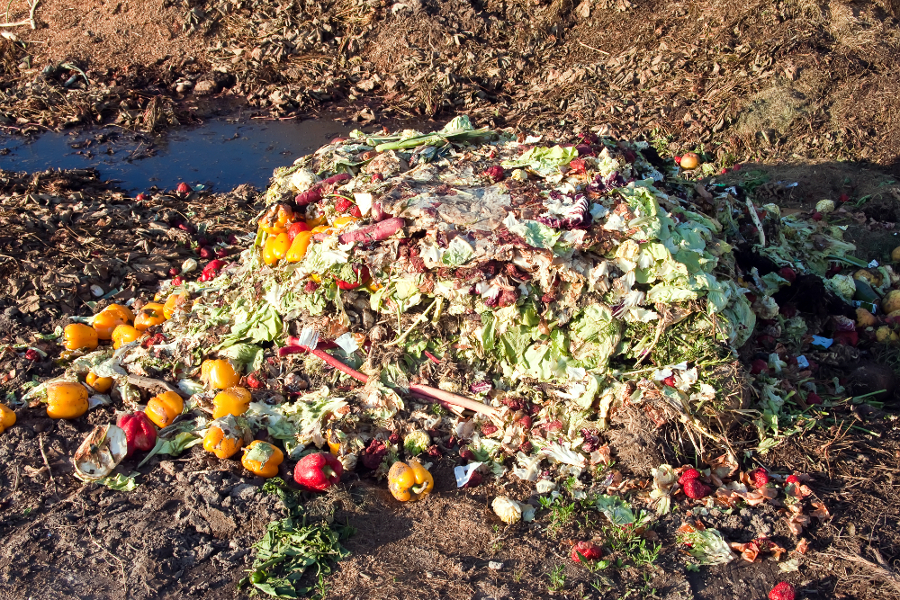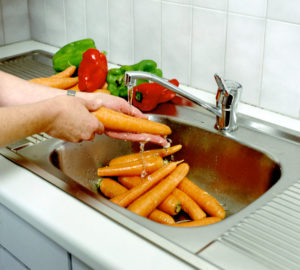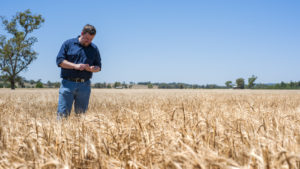
a pile of food waste
Food for thought: make a simple change to reduce the amount of food waste you create.
When you tuck in to your lunch today, you’re probably not thinking about where the grain was grown to make the bread in your sandwich, or how much water was used to grow the tomato in your salad, or whether the beef in your meat pie contributed to increased greenhouse gases. You’re also probably not thinking about how changes in our climate might affect the production of these foods in the future. But you might spare a thought for those that go hungry every day and how lucky you are to have access to nutritious, fresh and tasty food in your tummy.
World Food Day is celebrated every year on 16 October to remind us that we need to ensure food security as the global population increases and as the climate changes. It also prompts us to think about the links between the world’s poorest who don’t have access to enough food, the need for more sustainable agriculture practices and the importance of minimising food waste.

Wasting food also wastes the resources that go into getting it from the paddock to your plate.
Over one-third of all food produced globally is lost or wasted. In Australian households alone, 4 million tonnes of food is wasted every year.
All of that food takes water and energy to produce, transport, prepare and sell. And all these resources are wasted when we throw food in the bin. In fact, global food loss and waste generate 8% of total greenhouse gas emissions annually.
You can also save your hip pocket by not wasting food. The average Australian household throws out over $1000 of food every year – enough to feed an average household for a month.
Change starts in the home and it also starts in the classroom. That’s why this year, we’re working with our good friends Bayer to teach students about why it’s important not to waste food.
To mark World Food Day and the launch of our new education resource for schools Feeding a Hungry Planet, our Sustainable Futures education program is heading into schools around the country to spread the word about saving food.

As our climate changes so must our agriculture methods.
Sustainable Futures teaches the science behind sustainability. Feeding a Hungry Planet is all about the science behind the resources that go into food production, how our changing climate contributes to challenges in the agriculture industry and how technology is alerting food production.
To reduce your contribution to food waste, here are our top 5 tips for saving food at home:
- Install a compost bin in the backyard or worm farm on the balcony so you can convert your kitchen food scraps into nourishing food for your plants and garden
- Save peelings and off-cuts from your vegetable preparation and make a tasty stock
- Plan your meals in advance or use a menu planner so you only buy what you need from the shops or market
- Eat your leftovers for lunch – don’t just leave them in the fridge
- Store food correctly to make sure it stays fresh for longer – check out these tips for food storage
Sustainable Futures is an education program that combines the latest in climate science with education for sustainability sponsored by Bayer.


12th January 2017 at 9:06 pm
Number 6 get a worm far, use some of your veg scraps to feed them. Harvest your own biodynamic worm wee fertilizer.
10th January 2017 at 1:15 pm
Is this the friendly BAYER that uses an insecticide that is killing bees?
3rd November 2016 at 2:11 pm
Whilst I agree that not much is wasted at home, after working at a place that sells food, a believe about half the food we sell is thrown out or left so I believe the figures above are correct
10th January 2017 at 8:50 pm
Yeah, I’ve been a chef for many years, and the wastage sickens me. You can try to bring in recycling, composting and ethical and responsible sourcing of product, but if it takes up a second of paid staff time, or costs a cent of company money, no freakin way dude!
14th October 2016 at 4:37 pm
To be honest, I simply don’t believe the figures that suggest one third or thereabouts of all food is wasted. I live in a vegetarian household and my estimate is that we waste less than 1 or 2% of edible food and less than 5% of total food products (i.e., potato peels, carrot tops, etc). Most food waste occurs either on the farm with producers having to meet very strict guidelines in terms of what is saleable or at the food processing factories. In the home, while the 5 food-saving tips are useful, they will only make a tiny difference to the total amount of food waste.
4th November 2016 at 11:37 am
While I agree that a lot of food waste occurs from farm and factories, practising 5 food saving tips will and does make difference to the total amount of food waste regardless if it is tiny or not. When everyone practices the same, it all adds up.
12th October 2016 at 7:15 pm
Be on the pension or other, it teaches you how to be frugal.